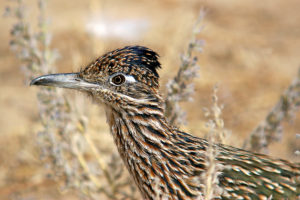Hopefully, you already know that the call of greater roadrunners (Geococcyx californianus) isn’t actually “beep beep.” But do you know what roadrunners actually eat? How about where they live? Like many wildlife species, roadrunners are the subject of several “myths.” One of the goals of NatNotes is to provide accurate information about Texas rangelands and wildlife in a brief, easy-to-read manner. So today, let’s do a fact check on roadrunners!
Roadrunners have been blamed by some as a factor in the decline of northern bobwhite quail. While it is true that roadrunners will eat quail chicks if given the opportunity, and the eggs of ground-nesting birds are an easy snack for many predators, quail are not specifically targeted by roadrunners. In fact, a south Texas study found quail remains in just one of 120 roadrunner stomachs examined. Roadrunners take prey opportunistically, feeding on a wide range of species when given the chance. Common roadrunner prey includes small mammals, lizards, snakes, frogs, insects, and scorpions.
Another roadrunner misconception is that they only live in deserts. Roadrunners are well adapted to arid conditions and are often seen in desert habitats. However, they actually occur across habitats that receive a range of precipitation, and roadrunner populations have recently been expanding eastward. The common theme to roadrunner habitat is semi-open, scrubby vegetation in sparsely populated areas.

Greater roadrunner (Geococcyx californianus). Public domain image.
If you want to learn more about wildlife and range management in Texas, check out AgriLife Extension’s new Wildlife Fact Check series starting on May 31 in Frio County. This series of seminars will be hosted live in a different county in southwest Texas each month and broadcast to four other counties. Watch the NatNews page for more information!